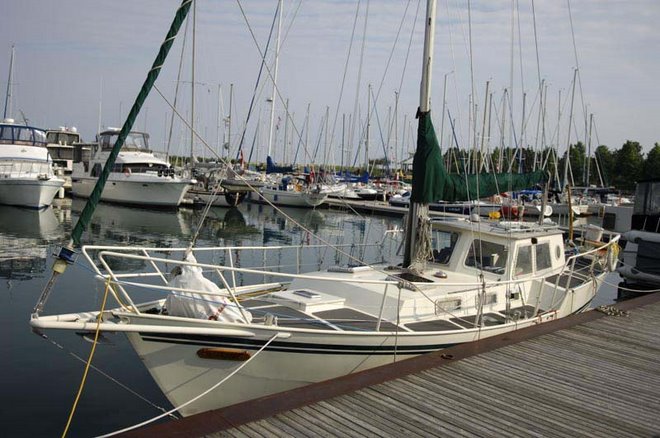| You don't have to be British or a sailor for some of these names to have resonance. |
And the stamps are going to a dollar each.
The reason? Canada Post has a...wait for it...pension shortfall. So they are raising prices and cutting service to make sure the already retired and those approaching said state of bliss can get their pensions nicely built up, in case they beat the actuarial death pools and have the temerity to persist. Given my recent and older writings on the topic of "the sailing life versus public finance", I may have to change my name to Captain Cassandra.
To be fair, I understand why paper-style mail is fading: I can't recall the last time I either sent or received an actual letter, although I have stacks of them filed from childhood until about the mid-'90s (I took to e-mail back when it was a UNIX-looking and vaguely woody thing). But, primarily for accounting reasons, I still gather paper bills and receive paper cheques; booting it down to a communal mail hutch blocks away has little appeal beyond the theoretical economies of scale. So sic transit gloria postie, I suspect. Fifty years on, the name Penny Black will cease..if it hasn't already...to be an understandable pun.
So there I was, polishing one of my sextants, when I heard that the BBC is taking a survey on the "usefulness of the Shipping Forecast". Now, aside from the baffling proposal that I have not just one, but multiple sextants requiring a quick rubdown, there are perhaps for some readers some puzzling words in the preceding sentence. The Shipping Forecast is one of the most heeded radio broadcasts in the world, even if it is opaque in its nomenclature and of nearly no use to non-sailors or those not currently standing outside in the rain somewhere in the British Isles (including Ireland).
The Shipping Forecast is a four-times-daily, densely written and comprehensive report of weather and sea conditions surrounding all of the British Isles out to some hundreds of nautical miles. A production of the UK Met Office, who've been issuing it thanks to the initiative of Darwin's skipper Robert FitzRoy via telegraph, shortwave and later, FM radio (Radio 4), it's also now a webpage and presumably also a Twitter feed, a pop-up app and a Facebook page.
Here's the often-heard theme music, which I first heard as a 12-year-old on my first trip to Britain, when, jetlagged and excited to have been anywhere, really, I was allowed to listen to the radio past midnight:
| From Jack Tar to ASBO chav in a hundred years. |
And now, thanks to the assumed ubiquity and magical range of various handheld tablets, phablets and phones, oh my, the utility of a simple radio broadcast...a weather report for sailors...is being questioned, or at least evaluated in a manner that suggests an exit plan is in the works. Thus are service reductions spray-painted as service enhancements, and Oceania has always been at war with Eastasia. Expect more of this sort of thing from our political masters in the future.
Naturally, I am aware that I don't pay for British radio services, and that radio is only one of many ways through which to get information, and I should add that I use such ways and, when in a WiFi-rich urban environment, do not object to them in the slightest. But the beauty of radio is its price, its reach and its simplicity: these are attractive features on a boat, whereas a "narrowcast" dependent on four bars on a satellite phone a thousand NM off soundings is less so. The potential demise of Really Useful, to quote another British institution that may have no place in the future, services like shortwave radio broadcasts and the Shipping Forecast may make passagemaking both quieter and lonelier than has been the case for nearly a century.




2 comments:
I hope they don't cancel it. This is a funny version of the esteemed forecast.
http://www.dailymotion.com/video/xasqt4_the-shipping-forecast-bbc-radio-4-s_fun
Sure, it's easy to mock, but if you are actually at sea and need to know in a rapid and energy-efficient way the overview of the approaching weather situation, it can be a very useful service.
It's entirely a byproduct that it is also a handy sleeping aid if one is bundled up ashore.
Post a Comment